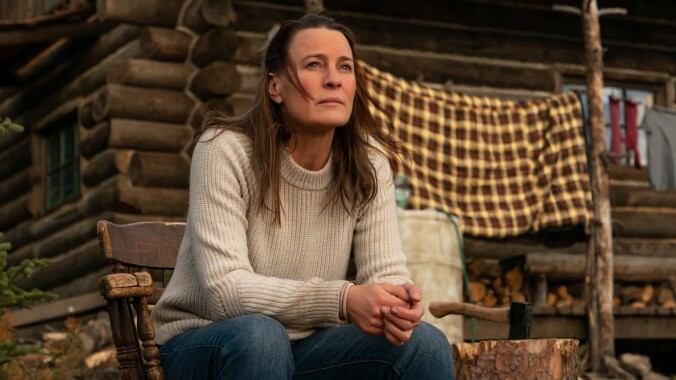, the first feature film directed by Robin Wright, a fruitless therapy session captured in anemic neutral colors gives way to a glorious, sun-specked drive up the mountains of Wyoming. Suicidal after a devastating loss, Edee (Wright, pulling double duty behind and in front of the camera) has gone off the grid, purchasing a dingy log cabin where she plans to live out her days. The immediate contrast between our protagonist’s lifelessness and the vitality of the natural world establishes
as the familiar story of a white woman braving the elements to restore her spirit. Yes, it’s essentially the same premise as the Reese Witherspoon vehicle
. But while that tale of redemption-via-communion-with-nature was measured and unexpectedly raw, this one is neither original nor particularly powerful.
Emotionally ravaged by the death of her husband and young son, Edee withdraws from society. “Why would I want anyone to share in [my pain]?” the widow explains in therapy. “They can’t anyway.” She trashes her cell phone and gets rid of her vehicle, cutting herself off entirely from other people when she moves into her hastily acquired deep-forest cabin with a box of non-perishables and a foolhardy plan to eventually live off the land. From the outside, Edee’s new pad, which overlooks a valley of flora and fauna, looks idyllic. But its bare-bones accommodations prove challenging. A mediocre outdoorswoman, our ex-suburbanite has difficulty chopping wood, hunting food, and using the outhouse. As winter descends, her troubles take on a new gravity when a run-in with a bear wrecks her food supply.
With her square-jawed beauty and exacting gaze, Wright brings intelligence and dignity to her character’s self-imposed martyrdom. It’s a weighty performance from the routinely strong actor. Maybe too weighty: Even in her blunders, Edee is solemn and deliberate. The same qualities that in recent years have made Wright such a go-to strongwoman (as House Of Cards’ Claire Underwood or a literal warrior goddess) only enhance the mannered quality of her survivalism drama. At times, Land has a bit too much in common with uplifting Lifetime fare. Co-writers Jesse Chatham and Erin Dignam show little interest in capturing the nitty gritty of Edee’s grueling lifestyle or truly unpacking the psychic toll of her utter solitude. What we’re left with is a woman stunted by grief and all too willing to let herself perish—a harsh truth conveyed by Wright’s performance but not properly developed in the screenplay.
Land’s biggest misstep comes with the introduction of good Samaritan and potential love interest Miguel (Demián Bichir), another lost soul who rehabilitates our heroine after a near-death experience. Under the condition that he not bring news from the outside world, she begrudgingly assents to his visits. And as he teaches her some handy survival skills, the two loners expectedly grow close, pulling Edee out of her misanthropic torpor. As written, the relationship is clearly meant to convey something about the power of empathy and human connection, but Land only grazes those themes. Though Bichir, with his husky growl and warm, easygoing demeanor, is a welcome presence, the character functions too bluntly as a savior, teaching Edee the ways of the world and reminding her of her humanity and relative privilege. (This last point feels particularly perfunctory, given how briefly it’s touched upon.) Miguel exists solely as the means to this white woman’s healing, cheapening her journey while falling into a stock saintliness.
At the very least, Wright demonstrates directorial competency, having previously honed her chops with several episodes of House Of Cards. But from the folksy acoustic score to the slow-motion flashbacks and hallucinations, Land grasps at profundity via the most overplayed methods. The harrowing details surrounding the death of Edee’s husband and son are withheld ’til the end. Yet by the time we reach Edee’s big, cathartic disclosure in the last act, any sense of mystery or expectation has been wiped out by the film’s blandly obvious trajectory. Land ends with a phone call that reconnects Edee with her roots, suggesting an inevitable return to normalcy—her harebrained cabin scheme, like the movie itself, already fading from memory.


 Keep scrolling for more great stories from The A.V. Club.
Keep scrolling for more great stories from The A.V. Club.